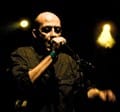Due to another musical event that night in Nice, few people were present at the “Children in the Sun” concert. Only about fifty people had gathered for the occasion. The funds raised for Secours Populaire during this evening were modest, but the proceeds remain satisfactory as several children will be able to finally spend a day “in the sun” away from their daily lives.
“Show must go on”
The “show” begins with the organizer and singer, Jean Pierre Bruno, wearing a vintage shirt and long hair. A very rock’n’roll man. Beer in hand, the artist recalls the purpose of the performance: to help disadvantaged children, to be generous.
With his early fifties, the singer reminds one of Joe Cocker. You can see him living his music and getting intoxicated to the rhythm of the somewhat psychedelic guitar. The band has the difficult task of setting the mood among the few people present.
Jean Pierre Bruno performs his flagship song: “Ordinary Madness.” It tells of his own life, his mental illness, and his suffering. He would later say that he had never played it so well. He is seen falling to his knees, living with his whole being this rock lament that calls for tolerance.
This is followed by a touching tribute to Alain Bashung, the band performs “Madame Rêve”.
The singer is in a semi-trance, he has managed to bring the audience to a level of bliss and joy almost equal to his own.
In the end, a band with committed lyrics against indifference. For a more tolerant and better world.
But the highlight of the evening was the band Chinaski. Jean-Louis Chinaski, leader and singer of the band, floods us with his rock voice and communicative energy. The musicians are talented, their guitar and bass solos are of undeniable quality. The song lyrics are in French and do not leave one indifferent.
The band Chinaski takes us on a journey mixed with pure rock and touching laments about the decline of man, unemployment, and madness.
In another song, titled “Venice,” a man wonders whether his wife has left or if he accidentally killed her… A drama sung in a festive and catchy rhythm.
In the audience, a child aged 7-8 years sings the songs, knowing the lyrics by heart. A moment of warm interaction with the audience is created. The influences of Bukowski, an American author known for his alcoholism but also for his poetry, are clearly visible.
In one song, one can easily recognize the scenes depicted in the writer’s works.
Gradually, madness takes over the band. The instruments become alienating and the singing increasingly incredible. Jean-Louis Chinaski plays the madness to perfection. He becomes raving mad and collapses on stage after performing the climax of their performance. “Poor is the man who is never mad at least once in his life,” he declares, borrowing a meaningful quote from Charles Bukowski.
The third band to take the stage at the “Children in the Sun” concert is the Dum Dum Boys. A shadowy atmosphere sets in, smoke takes over the stage. The singer, a slim man in a black suit, soothes the audience by tapping his foot to the rhythm of the drums.
The 1980s are clearly present if one is to believe the style of the two guitarists on stage. A fashion style that does not improve the music, too saturated during several songs. However, this band, created in 1985, has a comparable experience in rock music and definite humanity.
At around 11:30 p.m., the last band of the concert arrives, and not the least: Quadricolor, a band of the future that has not finished making itself heard and of its new album “Euphony” soon in the stores.
Big surprise from a band of young high school students, future baccalaureate graduates, straight out of the Conservatoire de Nice. The four boys start with English rock, a language that the singer, Guillaume, seems to master very well. He shows rare stage talent, guitar, keyboard, and vocals, the young man performs and gives the songs a style comparable to the English band Blur.
The virtuosos effortlessly handle their instruments and afford impressive sound and voice effects.
The young fans were at the rendezvous, the groupies scream, and the band members use their humor to give an ever more festive aspect to their passage on stage. A small choreography even gets the band’s fans dancing, the others jumping on the spot. All the elements of a great rock concert are gathered.
Interview with Jean-Pierre Bruno:
Nice Premium: “For what reasons did you organize this concert for the benefit of children?”
Jean Pierre Bruno: “It’s simply disgusting that disadvantaged children never go on vacation, so as an artist, I compensate for the lack of ideas of politicians.”
NP: “Do the artists who will perform tonight also fight for this cause alongside you?”
JPB: “Yes, they are friends who are sensitive to the cause of children.”
NP: “This is not your first charitable act…”
JPB: “I have been fighting for the children here and elsewhere for a long time. With Sol en Si for children with AIDS, an orphanage in Bucharest, to pay for an airline ticket for a little girl who had to undergo surgery in Chicago, and of course the three operations with Secours Populaire.”
NP: “Why this generous soul?”
JPB: “I have two sons myself, healthy and brilliant students [17 and 19 years old, ed.]. I think it is the role of the artist to compensate for the deficiency of politicians in certain cases, I take the example of Coluche with the Restos du Cœur, in all modesty.”


